Ideal MEGA Catches Fire and Is Recalled: Is This the End of the Boom for New Energy Vehicles?
![]() 11/07 2025
11/07 2025
![]() 470
470
Once again, a fire has thrown the Ideal MEGA—a model that had just overcome design skepticism—into the whirlwind of public scrutiny.
On October 23, an Ideal MEGA driving normally on a Shanghai street suddenly burst into flames under the watchful eyes of bystanders. Flames engulfed the vehicle within seconds. Although no injuries were reported, the shocking surveillance footage quickly went viral online, sparking widespread criticism.
In response to mounting public concern, Ideal Motors issued an apology statement shortly after the incident and announced a voluntary recall of 11,411 Ideal MEGA vehicles produced between February 18, 2024, and December 27, 2024, effective November 7.
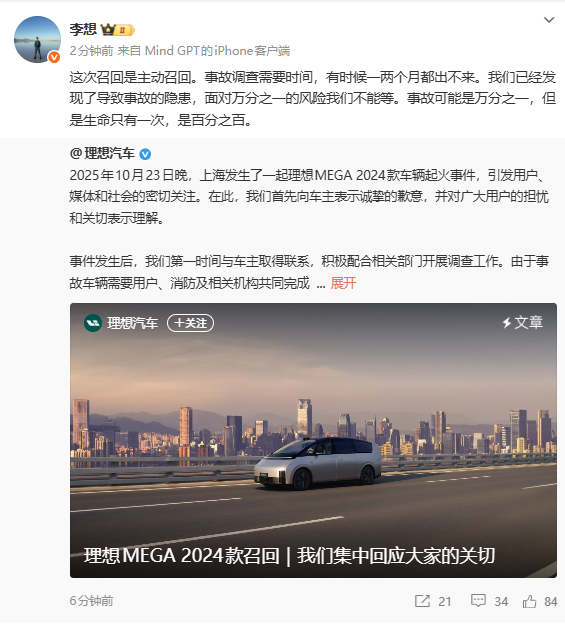 ▲ Note: Image sourced from Weibo.
▲ Note: Image sourced from Weibo.
However, this proactive acknowledgment of fault did little to quell the controversy. Safety concerns surrounding new energy vehicles have once again taken center stage. After years of rapid growth, industry players, regulators, and consumers are now reassessing their views on new energy vehicles.
| A Costly Recall |
In its official statement on October 31, Ideal Motors attributed the incident to the "insufficient anti-corrosion performance of the coolant," which could lead to corrosion and leakage of the cooling aluminum plate under specific conditions, potentially causing thermal runaway of the power battery in extreme cases. Behind this technical jargon lies a fundamental safety risk.
"Thermal runaway of the power battery" is one of the most dangerous scenarios for electric vehicles. It cannot be resolved with a simple OTA software update or minor component replacement. Once a battery enters thermal runaway, an uncontrollable chain reaction occurs internally. Temperatures exceeding 100 degrees Celsius can cause a battery short circuit, releasing a massive amount of energy instantaneously, leading to a fire or even an explosion.
To address this safety issue, Ideal Motors proposed recalling vehicles produced between February 18, 2024, and December 27, 2024, and providing them with a "free replacement of newly optimized coolant, power battery, and front motor controller." This move effectively admits defects in the vehicle's core "three major components" and exposes the safety hazards of the Ideal MEGA.
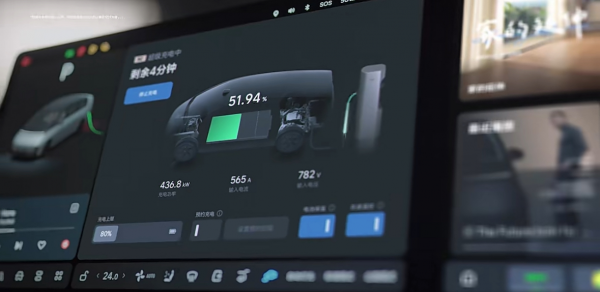 ▲ Note: Image sourced from Ideal Motors' official WeChat account.
▲ Note: Image sourced from Ideal Motors' official WeChat account.
For Ideal Motors, which is striving to break into the high-end market, the consequences of the incident and subsequent recall are severe.
The power battery pack is the most expensive component of a new energy vehicle, accounting for approximately 40% to 60% of the total vehicle cost. The CATL Qilin battery used in the Ideal MEGA costs roughly between 80,000 and 120,000 yuan. Assuming a cost of 100,000 yuan, the recall of 11,411 vehicles would result in a battery-related cost of 1.14 billion yuan.
When factoring in the additional optimized coolant and front motor controller, the per-vehicle recall cost skyrockets. Even for a leading new energy vehicle company like Ideal Motors, this substantial expenditure poses significant financial strain.
More serious and far-reaching than the financial losses is the damage to the brand's reputation.
Ideal Motors has always positioned "family" and "safety" as the core pillars of its brand. Founder Li Xiang repeatedly emphasized the model's ultimate safety features, including a fortress-like safety body and nine airbags, during the launch of the Ideal MEGA, attempting to position it as a symbol of future family travel safety. However, the spontaneous combustion incident on the street has completely shattered this carefully constructed safety image.
Following the incident, the capital market reacted swiftly. From October 23 to November 4, Ideal Motors' stock price fell from HK$86.9 per share to HK$77.75 per share, a decline of 10.53%, resulting in a significant loss of market value.
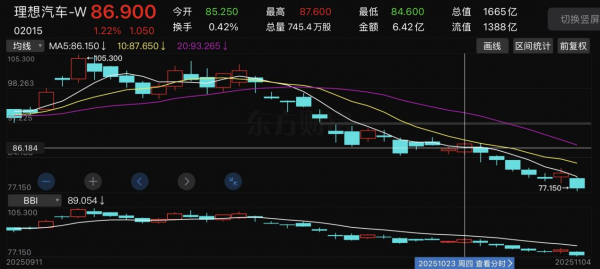 ▲ Note: Image sourced from East Money.
▲ Note: Image sourced from East Money.
While financial losses can potentially be recovered, the collapse of brand credibility and erosion of consumer confidence deal a heavy blow to Ideal Motors, which had just announced Jackson Yee as its spokesperson and was eagerly seeking new growth opportunities. This incident overshadows all the glamorous marketing narratives.
| The End of Rapid Growth: The "Safety Hammer" Falls |
Large-scale vehicle recalls, like that of Ideal Motors, are not isolated incidents. On September 12, XPENG Motors recalled 47,490 XPENG P7+ vehicles due to poor contact in the steering assist motor sensor wiring harness. On September 19, Xiaomi Motors also announced a recall of 116,887 SU7 standard edition vehicles due to safety hazards in the auxiliary driving functions of some vehicles.
Over the past few years, controversies and recalls triggered by safety issues have become an unavoidable "rite of passage" in the development of new energy vehicle brands and a legacy of their rapid growth.
To gain a competitive edge and secure higher valuations and market share, "speed over everything" has long been an unspoken rule among new energy vehicle brands. New models are iterated at an unprecedented pace, and the cycle from announcement to delivery has been compressed to the extreme.
In this "rush to succeed" atmosphere, safety engineering—which requires extensive verification and accumulation—and stringent quality control over the supply chain have been somewhat overshadowed by the allure of "innovation" and "efficiency." Especially with the rise of cross-industry automotive companies, while bringing a "catfish effect," they have also planted hidden dangers in the industry due to their lack of profound automotive manufacturing heritage and respect for safety.
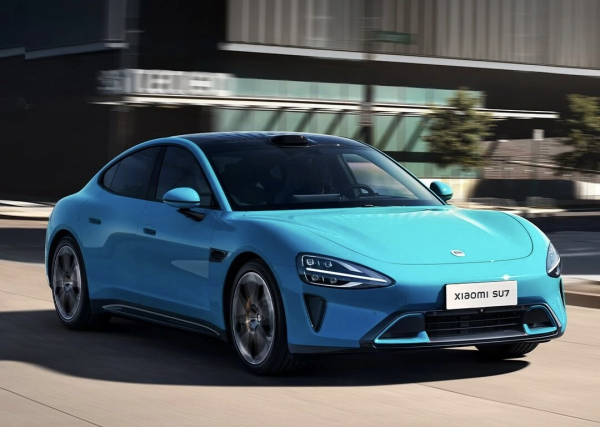 ▲ Note: Image sourced from Xiaomi Motors' official WeChat account.
▲ Note: Image sourced from Xiaomi Motors' official WeChat account.
This frenzy of rapid growth is now being forcibly brought to a halt, as national authorities are determined to end the unregulated expansion of new energy vehicles. Departments such as the Ministry of Industry and Information Technology (MIIT) and the State Administration for Market Regulation have frequently voiced their stance, with safety policy standards becoming increasingly clear, guiding the industry to transition from encouraged growth to regulated development.
On August 13, the State Administration for Market Regulation and the MIIT jointly issued the "Notice on Strengthening the Supervision and Management of Intelligent Connected New Energy Vehicle Product Recalls, Production Consistency, and Standardized Promotion (Draft for Comments)," explicitly requiring companies to assume primary responsibility for product safety and refrain from exaggerated or false promotion to avoid misleading consumers.
This document directly addresses the pain points of the industry, signaling the end of an era of excessive marketing. The popularization of automotive performance knowledge will return to a rational path based on facts and data.
On September 24, the No.1 Equipment Industry Department of the MIIT publicly solicited opinions on the mandatory national standard "Safety Technical Requirements for Automobile Door Handles" and amendments to three other mandatory national standards. These clearly stipulate the standard for hand operation space on car door handles relative to the vehicle body surface, targeting the hidden door handles that have caused numerous safety accidents.
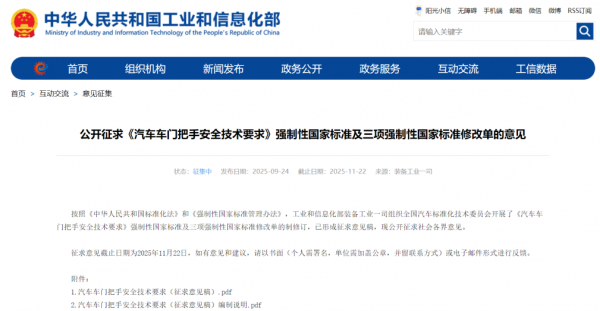 ▲ Note: Image sourced from the official website of the Ministry of Industry and Information Technology of the People's Republic of China.
▲ Note: Image sourced from the official website of the Ministry of Industry and Information Technology of the People's Republic of China.
This move clearly indicates that aesthetic designs that hinder escape and rescue in any emergency situation, such as power outages or collisions, will be mercilessly measured by the "ruler" of safety.
From the improvement of the voluntary recall system to the regulation of exaggerated promotion, and then to the mandatory requirements for specific design details, a regulatory net covering the entire chain of research and development, production, promotion, and recalls is tightening.
Against this backdrop, the recall of the Ideal MEGA is not only an inevitable choice for the company's proactive self-reflection but also signifies the end of an era where flaws could be tolerated and hardware deficiencies could be concealed under the guise of "software-defined vehicles."
| Aesthetics Take a Backseat, Rationality Steps Forward |
Under the new normal where safety reigns supreme, both automotive product design and consumer philosophy are undergoing a "correction."
Over the past few years, many automotive companies have invested significant effort into stacking comfort features such as "refrigerators, TVs, and sofas" to create differentiated selling points, attempting to transform cars into mobile "living rooms" or "entertainment rooms." Some brands have even enlarged the front trunk, promoting peculiar scenes like "fishing while sitting in the front trunk."
This trend of "living room-ization" is less about meeting genuine user needs and more about a means to create differentiation through the stacking of comfort features under intense competition. To some extent, it deviates from the core attribute of cars as a means of transportation.
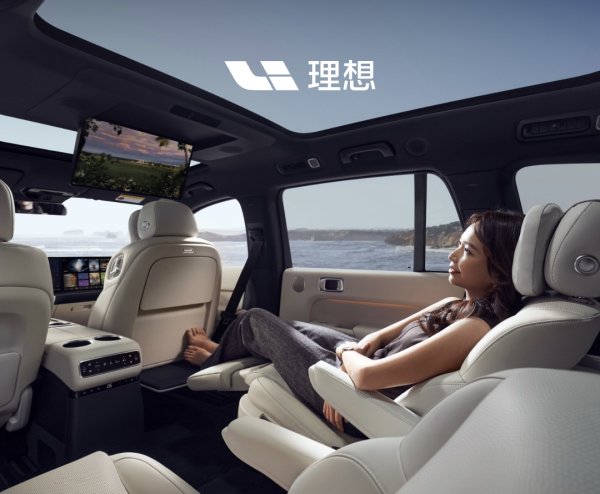 ▲ Note: Image sourced from Ideal Motors' official WeChat account.
▲ Note: Image sourced from Ideal Motors' official WeChat account.
Currently, the design philosophy of automotive products is undergoing a fundamental shift from "living room" to "cockpit." Designs like hidden door handles, which pursue extreme aesthetics and a sense of technology at the expense of safety in critical moments, will be forcibly optimized or eliminated.
Alongside changes in product design, the structure of the consumer base and the logic behind purchasing decisions are also evolving.
In the past, a significant portion of new energy vehicle consumers were young individuals pursuing cutting-edge technology and enthusiastic about performance parameters. According to a report by JL Research, the average age of the first batch of Xiaomi YU7 owners is only 27.7 years old, with 80% concentrated between 20 and 30 years old, mostly from first- and second-tier cities.
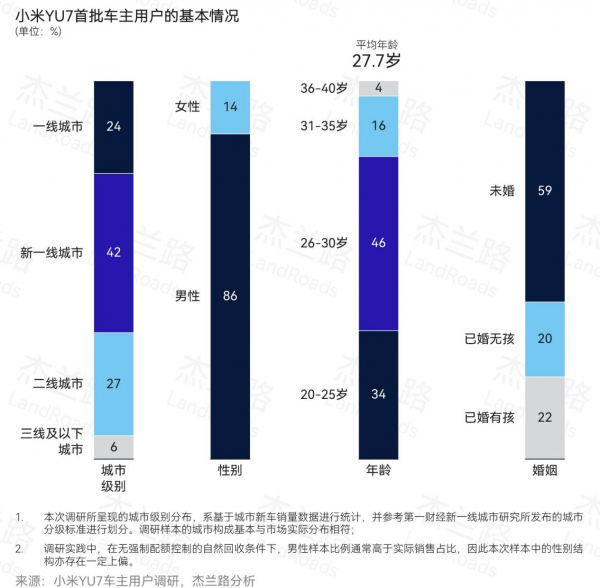 ▲ Note: Image sourced from JL Research's official WeChat account.
▲ Note: Image sourced from JL Research's official WeChat account.
These users are easily attracted by cool designs, exaggerated internet marketing tactics, and data such as "zero to 100 km/h acceleration." There have even been cases where some owners publicly protested due to dissatisfaction with certain safety speed limit settings in their vehicles, reflecting a mindset among young consumers that places driving pleasure above absolute safety to some extent.
However, with frequent safety incidents involving new energy vehicles, users are maturing rapidly, and a larger, more rational new consumer base is emerging. According to survey data from China Business News, consumer purchasing decisions now exhibit rational characteristics, with safety, price, and energy consumption costs ranking as the top three concerns.
For these increasingly rational users, an uncontrollable fire is far more shocking and concerning than a 0.5-second faster zero to 100 km/h acceleration. A door that can be smoothly opened after an accident is far more important than a screen capable of playing 3A games.
The fire incident involving the Ideal MEGA has awakened many consumers to the realization that, stripped of all technological, comfort, and luxury trappings, the ultimate value of a car remains safely transporting the driver and passengers from point A to point B.
The consumer base attracted by various flashy gimmicks is gradually receding, while a new rational consumer base that prioritizes safety and reliability is taking center stage. Their purchasing decisions will no longer be easily swayed by marketing rhetoric but will lean more towards brands with profound technological heritage, a strong reputation for quality, and the courage to take responsibility for safety.
As the market shifts from incremental expansion to stock competition, policies transition from support to regulation, and consumers move from enthusiasm to rationality, only new energy vehicle companies that truly invest their limited resources and precious energy into safety technology research and quality control will be able to weather the storm, gain a firm footing, and win market trust in this industry-wide shakeout.
Image sourced from the internet. If there is any infringement, please contact us for deletion.








